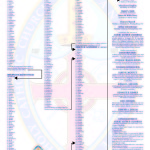
The Anglican Church in North America (ACNA) recently was invited to Russia to meet with the Patriarch. Kevin Allen at Ancient Faith Radio, after this meeting, interviewed Keith Ackerman, a bishop in the ACNA, and Fr. Chad Hatfield, Dean of St. Vladimir’s Orthodox Seminary. Both are actively engaged in interfaith dialogue between Anglicans and the Orthodox, and Ackerman had attended the meeting in Moscow (I’m unclear as to whether Fr. Hatfield attended or not). As time permits, there are a few points raised during the interview, that I hope to address. For now, I will limit myself to one point.
Kevin raises the question of the branch theory and Apostolic Succession. He wonders if the ACNA still holds that it is, in fact, one of the branches of the original church. This theory is widely held by Anglicans, and in particular by Anglocatholics, of which Ackerman is one (or at least used to be, I haven’t spoken with him in years). Ackerman responds by saying he is, in fact, looking at his apostolic succession while participating in the interview. That is, he is looking at the line of bishops, presumably leading back to the apostles, and beginning with the bishop who ordained him as a priest in the Episcopal Church (ECUSA) many years ago.
This points to an issue that will prove to be a major problem. You see, the Orthodox Church does not accept that Ackerman, or any Anglicans are in the “Apostolic Succession.” Even Rome doesn’t accept it, and they hold to a view of Apostolic Succession somewhat more in line with the Anglican view. The Anglican perspective is that Apostolic Succession is merely about the laying on of hands by subsequent generations of bishop. That there is something magical in that act that keeps one perpetually a member of the historic church. This goes along with their belief that once you are ordained a priest you are always a priest. Nothing you do changes this. If you were to become a bishop, then decide to become a buddhist, you would still have the ability to pass along this apostolic succession to someone else – even, presumably, if they were not Christian. Anglicans would argue that it is nothing “magical” but rather God’s grace, but the Orthodox don’t believe that God’s grace is permanently affixed to someone such that they can’t turn away from it and leave it behind.
The Orthodox perspective on Apostolic Succession includes the laying on of hands, but also requires a continuation in the teaching of the Apostles. Following is from a piece by Metropolitan Hierotheos of Vlachos on Rome, but it applies here:
Apostolic Succession is not simply a series of ordinations, but at the same time it is the sharing of revealed truth. When a church cuts itself off from the trunk of the Orthodox Church because of doctrinal differences, this means it no longer has the mystery of the priesthood. That is, when revelatory truth is lost and heretical opinions are adopted, this has implications int he Apostolic Succession. The Apostles transmitted the gift of the priesthood, but at the same time they gave, through regeneration, the entire revelatory tradition.
In his book on the Person in the Orthodox Tradition, he goes into some more detail, and I will attempt to post some of that later. However, this requirement to continue in the revealed truth is then problematic for the Anglican churches. Ackerman can claim that he holds entirely Orthodox beliefs (which obviously he doesn’t, at least not on this count), but in order for him to still be in succession, the requirement is that he be continuing in that stream. That is, nobody in his line of succession cut themselves off from Orthodox doctrine prior to their laying hands on him. I think he would be hard pressed to establish that all of his predecessors held even AngloCatholic beliefs, let alone Orthodox, so there is no practical way for him to still be in that line of succession.
As an addendum, we have several instances that I was aware of back in my Anglican days, where an individual would wander off and establish his own branch of Christianity that bore little semblance to historic, Orthodox Christianity. For amusement, you may want to read this. You can see several examples of sects arising out of this mistaken notion of Apostolic Succession, to whom the word heretic could be applied, but that might not go far enough.